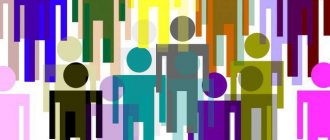“Libido” is one of the main concepts introduced into the world lexicon by the founding father of psychoanalysis, Sigmund Freud. During its existence in the cultural field, this word has acquired many meanings and interpretations. In modern psychology it is used as a synonym for sexual desire, but at the very dawn of psychoanalysis everything was much more complicated. We tell you how the role of libido has changed and what they propose to do with it now.
Attention! “Adult” content intended for persons over 18 years of age
According to Freud, there are four characteristics of drive:
- Source;
- an object;
- target;
- force of attraction (pressure).
According to Freud, the source of desire is always in the body. Example: How do we feel hungry? A person has a feeling of emptiness; they say it sucks in the pit of his stomach. This tension can increase and at some point a painful sensation occurs. And if you cross this line, a person may suddenly stop wanting to eat. When a person begins to eat, a release occurs; the person has eaten and enjoyed it. Accordingly, the source of attraction occurs in our body. It turns out that our body is a kind of material object, in contrast to the soul, which is something abstract. Nobody knows the answer to the question of where the soul is located in the body. It turns out that our body is also represented in the psyche. What our body looks like, what it is like and what it feels, all this has an idea in the human psyche. That is, every person has an idea, a representation of what his body is like. If such an idea exists in the psyche of every person, then it can be closer to reality, more adequate or less adequate. A very large influence on the perception of this image about one’s body depends on that primary object (mother), on how she perceived our body. It may be that you see a beautiful, pretty girl, but she will talk about how terrible she looks. And you will wonder why she perceives herself as terrible. Or for example, you can see a girl in the exhaustion stage from anorexia, whose ribs and bones will be visible, but she will talk about herself - God, I’m so fat. And you will wonder why she considers herself fat, because she is all skin and bones. It follows that a person’s mental image of his body may differ from what others see. A person may not even know what he is. Such people cannot describe themselves. This may indicate that they have identity . It's as if their body and self-image are poorly represented. Such people have a very unclear, vague idea of themselves. Such people often experience the phenomenon of splitting . For example, a person says: I’ll marry this girl, and I’ll have sex with another, and in the same way it works in the opposite direction, only with girls. As if this person cannot fulfill all his needs with one object.
To save, to be saved or not to touch?
Libido is a rather fragile structure. The speed of completing the puzzle and success can be affected by anything: stress, submitting an annual report, discussing the terms of a preferential mortgage, mistrust and fear of separation from a partner, or a broken leg. As a response to stress, libido can fluctuate both up and down.
Due to the stereotypes that society and popular culture establish regarding sexual behavior, many people may be dissatisfied with their type of attraction and believe that it needs to be changed. Sometimes these attempts can lead to even greater problems than in the “before” stage. Here are a couple of tips on what to do if you're not sure everything is as it should be.
Contact a specialist
A psychologist and sexologist will help you figure out what causes problems with desire and whether they exist. As we have already said, the problem may be psychological in nature, associated with trauma or chronic stress. An expert can help you get through it. If the problem lies in the physiological plane, you will be referred to an endocrinologist to prepare drug therapy. Remember that hormonal medications to correct libido must be prescribed by a doctor.
Freud's first theory of drive.
Instinct (Dictionary by J. Laplanche and J.-B. Pontalis)
An inherited pattern of behavior characteristic of a particular species of animal; it hardly changes from individual to individual, gradually unfolds over time, is resistant to shocks and is, as it were, subordinated to a predetermined goal. Here Freud says that animal reproduction is regulated by instinct. Some animals reproduce once a year, some more often, but one way or another everything is predetermined by instincts. Unlike animals, human sexuality is not regulated by instinct and for this Freud develops the concept of drives. Instincts are inherent in animals , but drives are inherent in humans . A process in which some pressure (energy charge, driving force) pushes the body towards a certain goal. According to Z. Freud, the source of attraction is bodily arousal (a state of tension). This goal is achieved in the object of desire or thanks to this object. Attraction is constant. Attraction operates on the basis of the pleasure principle (an increase in tension means displeasure, a decrease means pleasure).
Drugs
Among the drugs for the treatment of low libido, dietary supplements and vitamin supplements are popular in order to increase sexual desire in women. They are aimed at normalizing blood circulation in the pelvic organs, which helps release lubricant for contact and feel arousal. Certain products act instantly and have a long-lasting effect (up to 9 hours). Such drugs do not provoke negative manifestations from the reproductive system, as they include natural components.
Certain drugs affect the ovaries directly, leading to the production of the female hormone estrogen in large quantities. Thanks to this, the woman experiences a vivid orgasm, and the sensitivity of the genital organs increases. Before purchasing the drug, it is important to carefully read the contraindications and make sure the product is safe.
Note! It is prohibited to use the products during pregnancy, breastfeeding, under 18 years of age, leukemia, diseases of the liver, kidneys, circulatory system, cardiovascular system, as well as hypertension.
Forte Love
A natural remedy that increases sex drive in women.
Forte Lava has an excellent plant structure, which includes:
- Ginseng.
- Raspberry extract – normalizes blood supply to the genital organs.
- Green tea - renews immune strength, maintains tone, normalizes sensitivity.
- L-arginine is an amino acid that increases blood flow to the vessels of the genital organs, the volume of natural lubrication during arousal, and the sensitivity of erogenous zones.
- Caffeine is an activator of libido and vitality.
According to the manufacturer's promises, the drug can be used for sexual disorders, eliminates difficulties in achieving satisfaction from sex, and combats the symptoms of menopause. The product has contraindications for allergic reactions to the active substances.
Viagra
Viagra is available not only for men, but also for women. The key difference is that the tablets are pink. Their active component is considered to be sildenafil, which increases sexual pleasure, increases libido, increases the volume of lubricant secreted during arousal, normalizes the sensitivity of erogenous zones and leads to a more vivid orgasm. The cost of the drug for 1 tablet is on average 100 rubles.
The tablet should be taken 30-40 minutes before sexual contact, washed down with water. Do not mix the drug with alcohol or fatty foods. The duration of action of Viagra for women is 5 hours.
Spanish fly
4 sachets of this product will cost approximately 1,300 rubles. These are homeopathic drops - a dietary supplement that serves to normalize sexual arousal and increase sexual energy. The drug has an effective and long-lasting effect and includes plant and animal extracts from the aphrodisiac category.
Spanish fly has contraindications in case of personal intolerance to the components, allergic reaction, under the age of 18 years, during pregnancy and lactation. The use of the drug for hypertension, chronic cardiac, urological, gynecological, and digestive diseases is prohibited.
It is not recommended to combine drops with alcoholic drinks and fatty foods. Their side effects are allergic swelling, facial redness, nausea, increased body temperature, dizziness and malaise. The drops must be dissolved in water and consumed 10-15 minutes before sexual contact.
Silver fox
1 sachet of the drug costs approximately 350 rubles. This drug is produced specifically for women, does not provoke addiction, provides an effective long-lasting effect, helps with frigidity and low sexual desire.
The product includes lactic acid, the effect occurs 10-15 minutes after use, and remains effective for several hours. Contraindications include personal intolerance to substances, an allergic reaction, minor age, a tendency to bleed, inflammatory processes in the body, gynecological diseases, and low blood pressure.
Side effects of the drug include drowsiness, apathy, dizziness, facial redness, shortness of breath and malaise.
G Female
A stimulant for women that increases sexual desire and activates erogenous zones. A course of taking this drug with aphrodisiacs in its composition helps eliminate toxic substances from the body, improves estrogen production, and normalizes the menstrual cycle.
The drug is contraindicated under 18 years of age, during pregnancy, breastfeeding, during the menstrual cycle, heart attack, stroke, myeloma, peptic ulcer, diabetes. The drug can be used once a day.
Laveron
Dietary supplements for women are produced in the form of tablets. Laveron affects only sexual desire, does not affect reproductive function, increases sexual activity and normalizes blood flow in the genitals.
You should take 1 tablet 40-50 minutes before sexual intercourse (an hour or 1.5 hours after a meal). If the cases are complex, then you are allowed to take 2 tablets. The drug has no side effects, it is non-toxic, does not cause addiction, and does not affect the occurrence of headaches, changes in blood pressure and color perception.
Dualism of drives
The contrast between sexual drives and self-drives (drives for self-preservation). Freud describes this phenomenon using the example of feeding a baby, an example of oral, sexual attraction. When the baby is hungry, he begins to scream, he is given the breast, the baby begins to eat greedily and slowly becomes full, discharge occurs. He satisfies his desire for self-preservation, satisfies his hunger. At the time of feeding, the baby also experiences pleasure from the sucking process. It turns out that the very pleasure of the process is separated from the satisfaction of the drive for self-preservation, from hunger. Thus, the oral sexual desire is distinguished from the drive for self-preservation.
Contiguity of drives
“...sexual drives find their first objects, adjacent to what has value from the point of view of the drives of the ego, and the first sexual satisfactions are adjacent to the bodily functions necessary to maintain life”
At first, sexual desires serve the purpose of providing pleasure to the organ, and, when combined, they perform the function of procreation.
Sublimation of sexual energy
Sexual libido is energy aimed at satisfying sexual needs. If for some reason it is impossible to satisfy the instinct, a person subconsciously begins to sublimate sexual libido - redirects it in another direction, transforms it into energy of a different level.
You can sublimate energy in energetic sports (running, wrestling, football, boxing), in various forms of art (music, painting, sculpture). Many people with problems with their sex life throw themselves into work, finding in this a way to suppress and redirect their sexual energy into business and achieve great success.
Sexual attraction is natural, directed towards health, spiritual development, and social and personal relationships. The impossibility of full satisfaction can cause aggression, rudeness, and deviant behavior in a person. To avoid such consequences, you need to learn to sublimate energy into a safe and useful channel.
Regardless of how libido is viewed (sexual desire, focus on specific tasks in life, or love for others), its proper development leads to spiritual and personal growth, success in career and family life. In cases of severe psychosis, neurotic conditions and depression, many psychologists find the root of the problem in the disruption of the development of this instinct. Only a qualified specialist will be able to help with the problem that has arisen, teach a person to control his instincts and direct energy in the right direction to achieve a high level of self-development, social, personal and sexual life.
Author of the article: Ermakova Marina Leonidovna, practical psychologist, specialist in developmental psychology
Partial (partial) attraction
This term denotes those extreme elements to which the psychoanalysis of sexuality reaches. Each has its own specific source (eg, oral drive, anal drive) and target (eg, voyeurism drive, possession drive). The point is that our drives at the beginning of development are always partial or partial. Because they are autoerotic in nature. Initially, such drives are designed to obtain satisfaction from the organ. For example, oral attraction is receiving pleasure in the oral cavity. The term “partial” does not only mean that these drives act as varieties of a class of sexual drives. From a genetic and structural point of view, this term denotes drives that first exist separately and only then combine into various libidinal structures.
Food
The presence of spices, hot seasonings and ginger is welcomed in the diet, as they are called so-called “stimulants” of libido.
In addition, it is recommended to add the following products to the healing diet:
- Meat and fish products.
- Fruits and vegetables.
- Veal liver and kidneys.
- Greens (spinach, parsley).
- Sesame seeds, pumpkin seeds, poppy seeds.
- Seafood.
- Corn and lentils.
Autoerotism
In the broadest sense of the word, this is sexual behavior in which the subject achieves satisfaction using only his own body, without an external object. An example would be infant sucking on a pacifier and (masturbation). Autoeroticism is associated with primary narcissism. Sucking a pacifier is an autoerotic act; he receives autoerotic pleasure. Self-love can only develop if there is prior love from the object (mother). In a narrower sense of the word - immature, infantile sexual behavior, in which partial (partial) attraction associated with any one organ or excitation in the erogenous zone finds its satisfaction right there, on the spot, without resorting to an external object and without regard to integral body image (as is the case with narcissism). Metaphor – (lips kissing themselves).
Folk recipes
To increase their sex drive, many people turn to alternative therapies. The main thing is that there are no allergic reactions in the body to the natural components of the natural composition.
Below are some effective homemade recipes:
- You need to combine 30 g of dried rose hips and rowan. They must be filled with boiling water (700 ml). Next, let it brew under the lid, filter and consume orally in the morning and evening for 2-3 weeks.
- Grind the calamus root, mix with medical alcohol in a ratio of 1 to 5. The composition must be infused for 2-3 weeks. It should be taken orally three times a day, 20-25 drops.
Representative(s) of drive
- Representation is the mental expression of endosomatic excitations. Endosomatic is an arousal that exists inside the body that creates a representation at the psychic level;
- Affect [quantum of affect] is a qualitative expression of the amount of drive energy and its varieties;
- An emotional-affective state (German psychology) is a pleasant or unpleasant, vague or distinct state, manifested in a general mental tone or in a strong energy discharge.
Iatrogenesis
Iatrogenesis
- a mental state characterized by painful manifestations caused by a person’s communication with a doctor, who in some cases may turn out to be a traumatic factor creating a pathogenic situation.
Throughout their lives, many people have to deal with doctors who examine their health status, make a diagnosis, identify the causes of certain ailments, give appropriate recommendations, prescribe medications, and carry out a course of treatment. It would seem that, by virtue of his profession, a doctor should have a beneficial effect on the person who turns to him for help. This is often exactly what happens. However, there are cases when the doctor’s actions become a source of neuroticism in the patient and lead to the occurrence of iatrogenic neurosis. According to V. Frankl, sometimes one has to be wary of doctors who “have achieved unprecedented skill in breeding iatrogenic neuroses through thoughtless or thoughtless statements addressed to patients, as a result of which we can rightfully talk about iatrogenics.”
Seeking help from a doctor may be accompanied by the emergence or intensification of a person’s fear of expecting the worst. A doctor’s diagnosis that leaves no hope of curing the patient or generates excessive anxiety can play a pathogenic role in the formation of neurosis. Strengthened by the ill-considered actions of the doctor, the patient’s fixation on his painful condition becomes pathogenic, contributing to the emergence of a mental disorder. Hypertrophied introspection, based on the doctor’s statements about split personality, schizophrenic fantasies, delusional ideas and other pathological manifestations, aggravates the internal experiences of the patient, who may find typical signs of various types of mental illnesses described in the medical literature.
Psychoanalytic treatment of iatrogenic neuroses presupposes, first of all, the analyst’s sympathetic attitude towards both the patient and his illness. It is necessary to provide the patient with the opportunity to speak out so that he can objectify the symptom and at the same time distance himself from it. As the analytical work is carried out, the analyst explains to the patient what role the fear of expectation plays in the occurrence of the disease and the importance of hypertrophied introspection, which can disrupt the unconscious functioning of mental processes.
User, since you have reached this line, you have found something interesting or useful for yourself here. I hope you viewed the site in the Firefox browser, which alone correctly reflects the formulas found on the pages. If you liked the content, please support the site financially. Please disable ad blockers and click on the couple of banners at the top of the page. It won’t cost you anything, you’ll only see what you’ve already looked for or are looking for, and you’ll help the site stay afloat.
About love and hate
- Subject (I) - object (external world) (real polarity)
- Pleasure - displeasure (economic polarity)
- Active (to love) - passive (to be loved) (biological polarity)
Hatred is older than love. There is a saying in psychoanalysis:
The object is born in hatred.
While the mother and baby are not an object for him, she is an environment for him. The mother appears to the baby only at the moment when she leaves him.
Love
It comes from the ego’s ability to autoerotically satisfy part of its instinctual impulses through the achievement of pleasure received from the organs. It turns out that the ability to love is somehow connected with autoerotic attraction. First of all, love is associated with the filling of primary narcissism, which the mother provides. Initially it is narcissistic, then it passes on to objects that have been attached to the expanded ego, and expresses a motor desire for these objects as sources of pleasure. It turns out that at first love is narcissistic in nature and only then becomes objective. The preliminary stages of love appear in the form of preliminary sexual goals during the period when sexual desires undergo their complex development. The point is that in order to love an object, you must first love yourself.
The subject's love is initially narcissistic. This refers to the libidinal stages. Attachment or absorption is a type of love that is compatible with the cessation of the separate existence of the object, and therefore it can be called ambivalent. The point is that attachment and absorption refers to the oral stage, where the subject does not understand the difference between the Self and the object, where everything is confused, where love and hate are not separated and therefore they are confused with each other. For this reason, such love is ambivalent and tinged with oral sadism. Parting with the object with this type of love leads to the loss of a part of oneself or the complete loss of oneself and the disintegration of the self. At a higher level of anal-sadistic organization, the desire for an object manifests itself in the form of a desire for mastery, which does not care whether the object is damaged or destroyed. This form of the preliminary stage of love... is almost indistinguishable from hatred. That is, at the anal stage, love and hate also mixed together. And there is always a sadistic attitude towards the object. If the subject is fixed at the anal stage, then in such love there is a lot of control and desire to dominate the object. True love arises at the genital stage, where it serves as the opposition to hatred. True love is genital love , which is associated with a holistic relationship with the object. Where there is no desire to absorb or bite him, where there is no desire to sadistically dominate him, but there is an understanding that there is another different from me. Then respect and love for the desires of the object arises. There is an idea here that the object may have desires that are different from my own.
Reasons for decreased sexuality
Sexual desire is affected by a number of psychological and physiological conditions, and such changes are not for the better. For example, it is possible to restore sexual desire in case of hormonal pathologies using pharmaceutical methods, but you can really get rid of critical emotional states only at an appointment with specialists, a sexologist. Before starting effective therapy, it is necessary to reliably identify the cause of the deterioration in general well-being, decrease in sexual desire, and then eliminate the provoking condition.
Reasons for decreased libido in women:
- Changes in hormonal levels – hormone imbalance. This depends on the woman’s menstrual cycle and other biochemical processes in the body. A decrease in sexual desire in women can also be noted during menopause.
- Unbalanced diet, addictions.
- Lack of self-confidence and self-attractiveness. Excessively strict upbringing in childhood can be the cause of many complexes that prevent a woman from opening up to her partner. As she ages, she may even avoid intimacy due to age-related changes.
- Diseases, use of certain medications.
- Stressful and depressive states, overexertion.
- Loss of emotional connection with a partner. In women, sex and emotions are closely related to each other, and the lack of sexual desire in women is quite natural if she does not feel a spiritual kinship with her partner.
Reasons for decreased libido in men:
- Unbalanced diet, poor nutrition, excessive drinking, smoking. Alcohol and smoking reduce the level of testosterone in the body, which leads to pathologies in the functionality of the gonads. All this causes disturbances in the receptivity of the spinal cord center and, as a result, a reduction in sexual desire in men is observed, the signs of which are expressed in a reluctance to have sexual contacts.
- Age period of the man. The older he gets, the less libido he gets.
- Obesity. Fat suppresses the production of male hormones and activates the production of female ones. In addition, an obese man is simply too lazy to move, it’s difficult for him, and the load on the cardiovascular system increases.
- Diseases and drug use.
- Hormonal imbalance.
- Psychological disorders, lack of self-confidence, fear of being ridiculed by a partner. For men, penis size and the likelihood of having sex for a long time play a big role. If he is unsure of these skills, he will avoid sexual contact.
- Stressful situations, fatigue, depression. Difficulties and conflict situations in the workplace and in the family have a negative impact on male libido.
Hatred
As the attitude towards an object, hatred is older than love, it corresponds to the initial rejection of the irritating external world on the part of the narcissistic self . Both Freud and Melanie Klein argued that the object is born in hatred. What does it mean? While the object is present near the infant, it is as if he does not notice her as an object. And in the words of Donald Winnicott , the mother is the environment. But as soon as the mother goes away and abandons her baby, at that moment the baby discovers her as an object. Therefore the object is born in hatred. As an expression of displeasure reactions caused by objects, hatred is constantly in close connection with the ego's drives for self-preservation, and therefore the drives of the ego and the sexual drives can enter into a contradiction that repeats the contradiction between hatred and love. If the drives of the ego dominate the sexual function, as for example at the level of the anal-sadistic organization, then they also impart the properties of hatred to the goal of the drives. Hatred is the opposition of love.
Libido in sexology
Since in modern sexology libido is interpreted as sexual desire, we will focus our attention on this aspect.
Libido is a psychophysiological phenomenon. The strength of sexual desire is determined primarily by the action of sex hormones. In women it is progesterone and estrogens, in men it is testosterone. But psychological factors also have a huge impact on sexual desire.
There are specific differences between the libido of men and women, and they are quite significant. Therefore, we will consider them separately. Let’s look at what the severity of libido depends on and what factors influence it.











